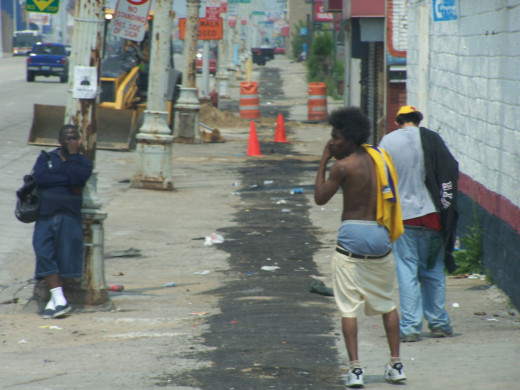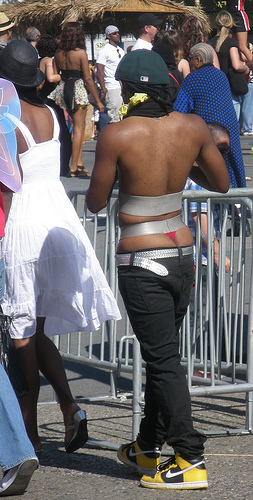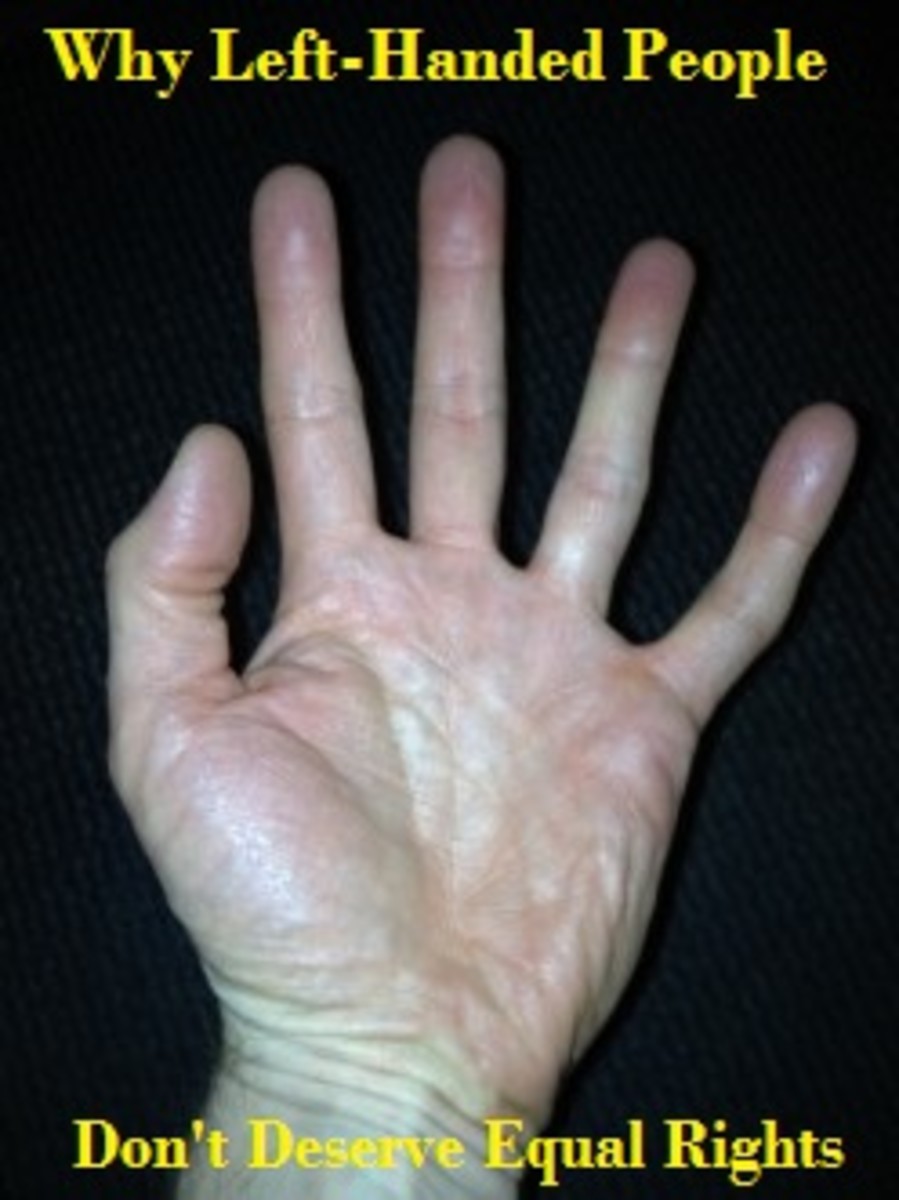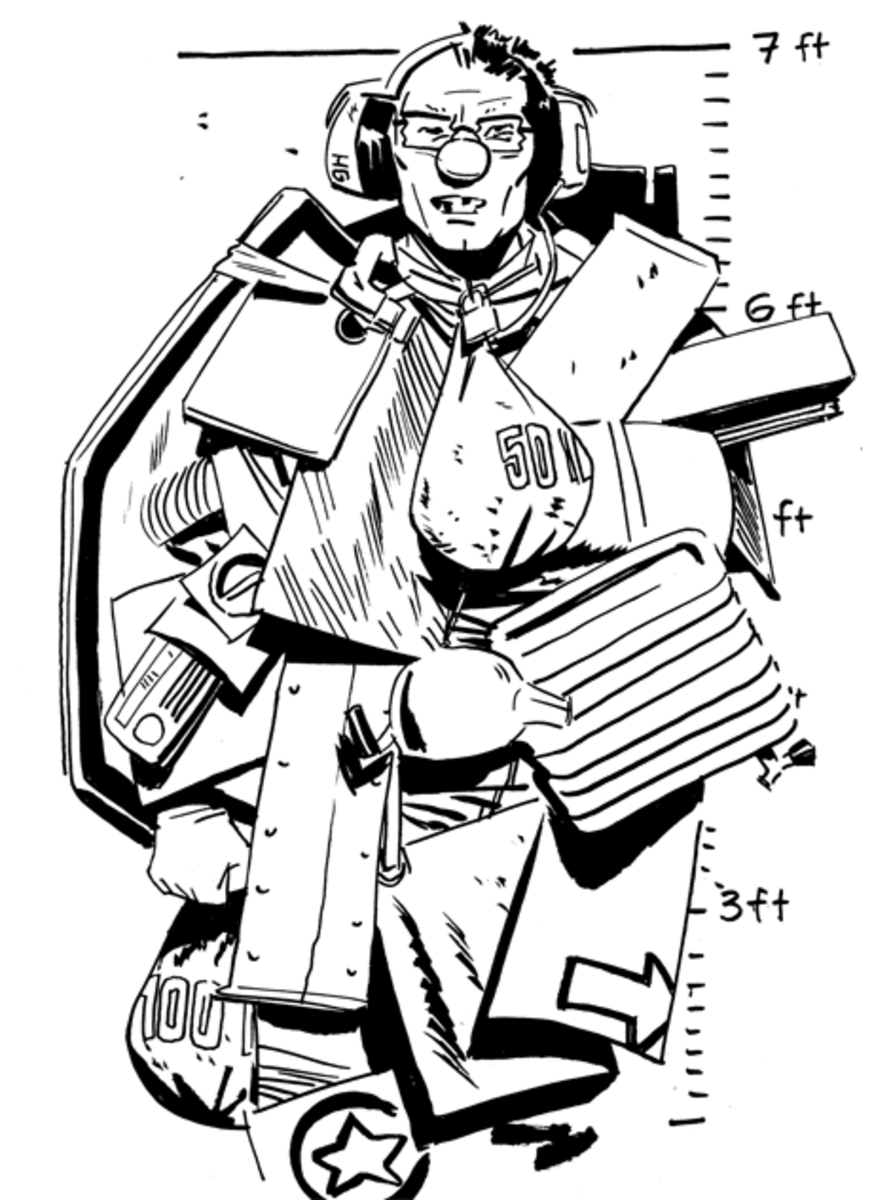Should "Saggy Pants" Be Illegal?

Indecent Exposure or Freedom of Expression?
While walking down the street on the way to a local shop, you see two men approaching. Their clothes are baggy, caps are on sideways, and their pants are hanging so low that you can clearly see their exposed under garments. You grab your purse a little tighter and make sure you have a firm grasp on your daughter's hand. Convinced they are gang members about to rob or rape you, you slip by trying not to make eye contact with them.
Thankfully, they seem to ignore you and keep walking. They may or may not have been gang members, but regardless, their attire made you think they were. It was offensive, rude and not something you feel they should be able to get away with in public. If you think to that the city should pass a law making it illegal to expose yourself in public this way you are not alone.
Many communities have begun to pass laws requiring people to pull up their pants in public places. While many people hail the laws as a victory for morality and decency, others like the ACLU call it a violation of people's civil liberties, that unfairly target black men. For example, In 2010 Opa-Locka, Florida, they passed a law that read, "It shall be unlawful for an individual to wear saggy pants apparel wherein underwear or undergarments are exposed in city buildings and parks." The crime is punishable by a fine of up to $250.00. (Source: Section 16-33 of the Opa-Locka, Florida Code of Ordinances) According to the Huffington Post, the law was recently expanded to include women as well as any public place.
In the Jersey Shore community of Wildwood, New Jersey, "saggy pants" is a crime that carries a penalty of up to $200 plus 40 hours of community service for repeat offenders. A similar law was considered in Thibodaux, Louisiana, but was ultimately rejected. In Springfield, IL, "saggy pants" are legal to wear, but you won't be allowed to ride on the city's mass transit if your pants, shorts or skirts are worn below your waistline.

Interpretation of the Law
On the surface, these laws may seem like a good thing. But are they setting a dangerous precedent where the city dictates to us what we can and can't wear? Is it up to the local government to decide what is too offensive to wear in public? Today it is sagging pants, but tomorrow will they also make it illegal to wear slogans on our shirts that are suggestive, contain foul language, or depict controversial imagery? While many people may be offended by this, who gets to make the decisions on what is and isn't considered offensive?
For example, what if an extremely conservative mayor decides to ban two piece bikini's on a public beach because he or she feels they are too revealing? Wear a one-piece that doesn't show off so much skin. And on the other side, what if an extremely liberal mayor decides to ban t-shirts that depict guns or other firearms on them in government buildings because they are too violent, and not sensitive to the recent shootings that have taken place in our schools? Will we sit back and let our local governments dictate to us what we can wear based on their interpretation of what is offensive or not?
Aside from passing laws, enforcing those laws, and then prosecuting offenders can also become convoluted. Such laws would have to be worded in such a way as to reduce the chance they can be too broadly interpreted by law enforcement and the courts. For example, the law in Opa-Locka, Florida states that if you wear saggy pants that expose your underwear, you are in violation of the law. But it doesn't define how much of your underwear has to be showing, or what "saggy" means. This leaves quite a bit open to the interpretation of the arresting officer and the courts. If you forget to wear a belt one day, and bend down to pick something you dropped on the street, can you be arrested if an officer spots the hem of your undies? Or perhaps you have saggy pants that also have a tear in them, revealing your under garments underneath?

Fashion Freedom
What we choose to wear is our choice. It is not up to the government to decide what is best for us. But on the other hand, those of us who don't like the fashion trend don't want to have to see it in public if we can avoid it.
It is commonly accepted to have signs on many business requiring that patrons wear shoes and shirts, or they will receive no service. Is it also reasonable to refuse service to someone wearing other types of attire the other patrons complain or the owner finds it inappropriate? That is the opinion of the Springfield, IL SMTD mass transit service. Although city ordinances do not ban saggy pants, after complaints from other bus riders, the SMTD has banned them. If you try to wear them on the SMTD bus, you will be asked to pull them up, or you won't be able to ride.
A Cure for Saggy Pants
No Shirt, No Shoes or Saggy Pants, No Service
Personally, I believe that is reasonable. Any business owner should be able to refuse service to someone they feel is dressed or behaving in an inappropriate manner. It is reasonable to expect that young ladies should dress like young ladies while in church. You wouldn't wear a swimsuit to Sunday service, would you?. Some high class restaurants require men to wear a jacket and tie, and will refuse service to those who don't. Health codes require shoes and shirts in almost all restaurants across the nation, even for patrons walking in off the street.
I also believe that indecency comes in many different forms, and our society tends to allow it. A woman wearing a thin t-shirt on a cold day with no undergarment underneath is far more revealing and indecent than a man wearing saggy pants and showing off his boxer shorts. Our laws are not being written to ban public displays of "THO", however. For that matter, I don't know of any laws requiring plumbers to even wear underwear, yet every plumber I have ever meant always had a prominent ass crack displayed anytime you bent over under my sink. In my opinion, that is much more indecent than "saggy pants".

Fashion Choices Have Consequences
Now, before you get too excited, let me remind you that poor fashion choices do come with consequences. If you wear saggy pants, you can fully expect to be laughed at and pointed at, and no respectable person in this world is likely to take you serious. But I believe this extends well beyond the saggy pants trend. After all, poor fashion decisions are made every day.
Dressing like a gangster? That could explain why you haven't been hired for a job. Those seventeen piercings on your face probably aren't helping either. Ladies, if you feel that you are not being respected by your boyfriends you might consider dressing like ladies instead of street walkers, strippers and bar maidens. If you look the part, you might be treated like one.
You see, despite the fact that you have a right to dress or look how you want, every other American also has the right to judge you based on those choices. Expect to be treated differently by those who disapprove of your choice. Your attire will not be welcome in certain places, and that is just the way it is. If you want to wear saggy pants while hanging with your "homies", go for it. Just don't ride the bus in Springfield. If you want to wear a sexy bikini on the beach, you can. Just don't show up that way to court.
I was in court many moons ago to appeal a traffic ticket, and watched as the local circuit court judge ejected a man from his courtroom for wearing what looked like pajamas for his pretrial hearing on a domestic battery charge. When the man started to argue his objections, the judge threatened to have him arrested on contempt of court charges. It was so hard not to laugh as he made his walk of shame out of the courtroom in front of dozens of onlookers still waiting for their case to be called.
What Do You Think?
Should wearing "saggy pants" in public be criminalized?
Conclusion
Bad fashion choices shouldn't be criminalized. True indecent exposure should be prosecuted to the fullest extent of the law. After all, we can't have people running around stark naked in front of our children. But as much as I hate to say it, wearing "saggy pants", short shorts, thong bikinis, t-shirts w/offensive slogans on them, or pretty much anything else that sufficiently covers up your bare essentials should remain legal.
But if you choose to wear them, I reserve my right to point and laugh and judge you the quality of your character based on your bad fashion choices. And I can finally ride the bus without seeing your britches.
Recent News Articles on Saggy Pants Bans
- A Fine for Wearing Baggy Pants on Boardwalk | NBC 10 Philadelphia
If you wear baggy pants in Wildwood you may be fined $25 starting next Tuesday. Earlier this month officials in the Jersey Shore city passed a law banning overly saggy pants on the boardwalk, prompted... - Thibodaux City Council considering saggy-pants ban | wwltv.com New Orleans
Pull up your pants -- that could soon be the message in Thibodaux if officials pass a law banning sagging pants. - City Votes To Expand Saggy Pants Ban To Ladies
OPA-LOCKA, Fl -- A controversial 2007 city ordinance that drew praise from conservative host Dr. Laura Schlessinger and criticism from the ACLU may now be expanded to women. Opa-Locka banned saggy pants and exposed underwear in city buildings six yea - WICS NewsChannel 20 :: News - Top Stories - SMTD Bans Sagging Pants on Buses
If you don't want your pants hugging your waist, find another mode of transportation. The Springfiel - Tulsa city councilor wants to ban saggy pants
TULSA, Okla. (AP) - A city councilor in Tulsa wants to ban saggy pants.






